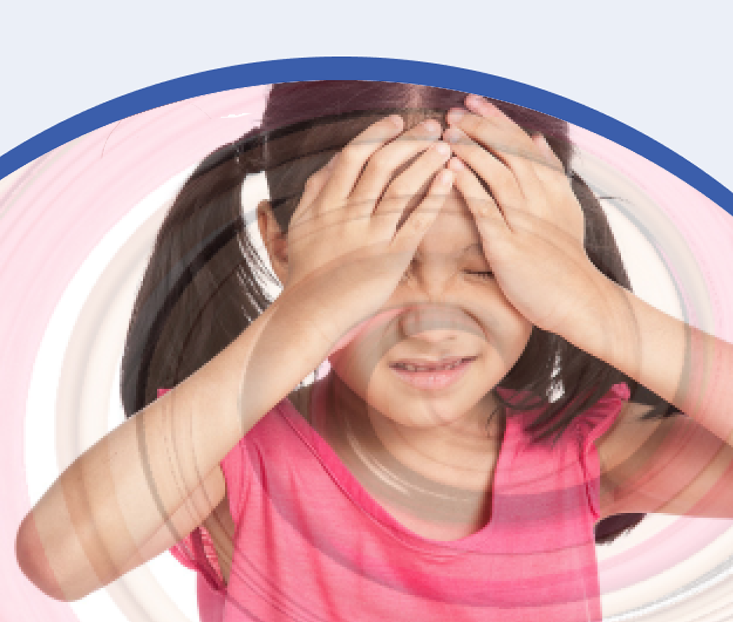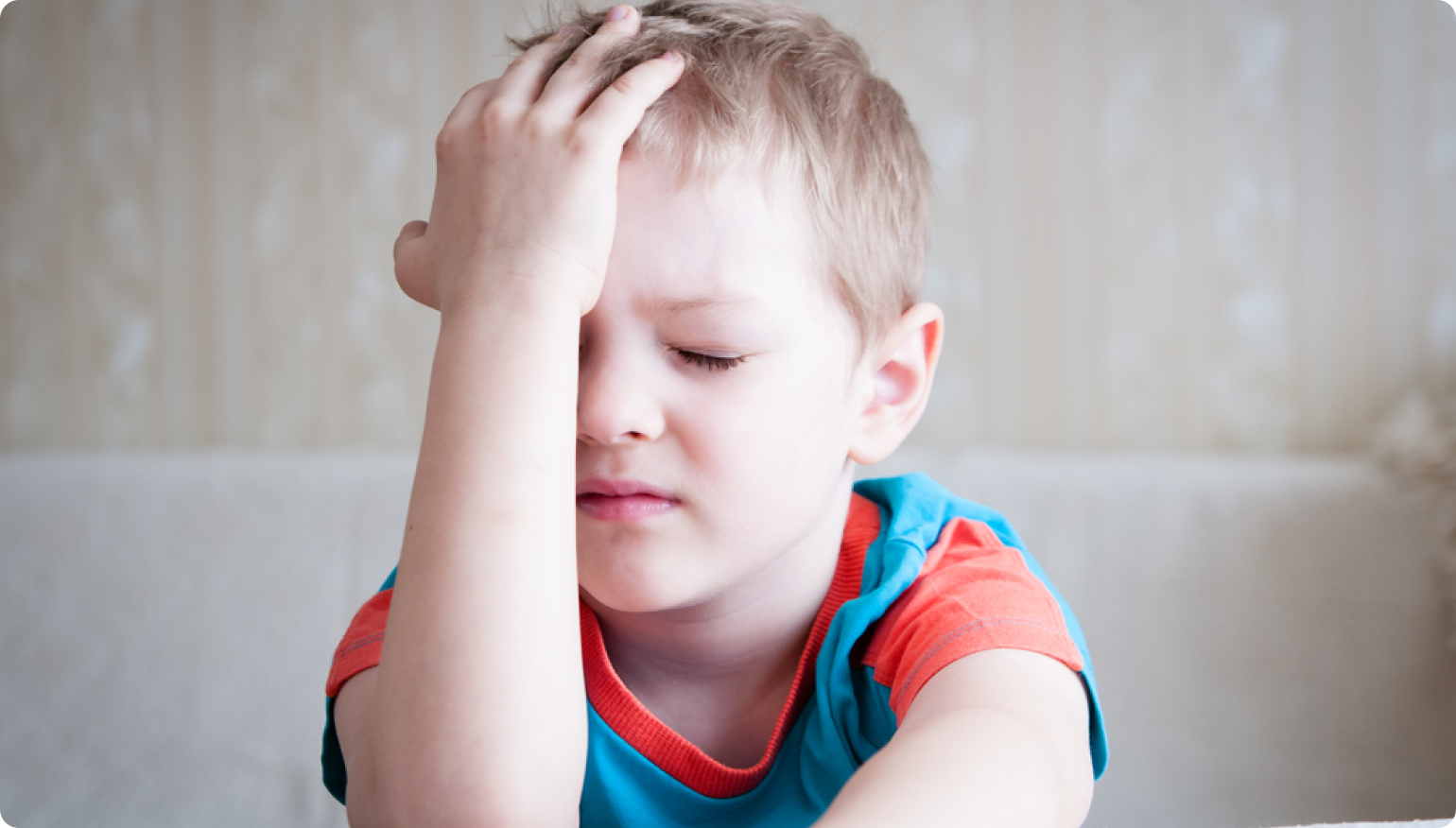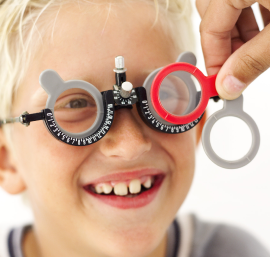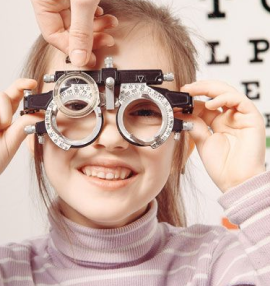Dizziness in Children
Could it be their eyes? Get treatment for your child’s dizziness.
Dizziness in Children
Could it be their eyes? Get treatment for your child’s dizziness.


What Causes Dizziness in Children?
Dizziness in children can make your child completely miserable - They might have difficulty attending school, paying attention in the classroom, and it can also impact their emotional well being.
A child having frequent dizziness might also complain of headaches and feeling nauseous. But did you know that headache and dizziness in your child could actually be the result of a slight misalignment between their eyes? This subtle misalignment is known as Binocular Vision Dysfunction (BVD).
Binocular Vision Dysfunction occurs when the slight misalignment between your child’s eyes causes your child’s eyes to be out of sync with each other. This makes it very difficult for the brain to make one clear image from the two misaligned images. Most people’s brains can transform two separate but aligned images into one clear image, known as Binocular Vision. But in children with Binocular Vision Dysfunction, it becomes difficult for the brain to process the two misaligned images into one clear image.
In order to fix this problem, the brain will force the eye aligning muscles to realign the eyes. However, the misalignment returns almost immediately, and over time, this continuous cycle of misalignment/realignment places an enormous amount of strain on the eye muscles, resulting in dizziness in children, as well as headaches, nausea, and many other symptoms.

Clumsiness in Children with BVD
In addition to being dizzy, children with BVD often experience clumsiness. In younger children, some clumsiness is not unusual, but coordination should improve with age. Persistent clumsiness that is not age-appropriate could indicate BVD.Learn more about clumsiness in children with BVD.
Headaches in Children with BVD
Children experiencing vision problems tend to frequently squint and strain their eyes in an effort to see the board at school or to read books and homework. Children with BVD are straining their eye muscles in an attempt to maintain eye alignment. These problems can ultimately lead to headaches throughout the day.Learn more about headaches in children with BVD.
Can a Concussion Be the Cause of My Child’s Dizziness?
When a concussion occurs, it’s common for the visual system of the brain to become injured, resulting in vision misalignment and BVD.Learn more about concussions and BVD.

Can Dizziness Be a Sign of Eye Problems? Conditions Often Confused with Binocular Vision Dysfunction
While Binocular Vision Dysfunction is a common condition, dizziness in children is often misdiagnosed as one of the below conditions, despite many of these being extremely rare.
- Vertigo: Children feeling dizzy who have been diagnosed with vertigo experience episodes of being unbalanced, or feel as if they are spinning. This is caused by a problem within the inner ear. Typically, when a child is experiencing vertigo their symptoms can be alleviated by traditional methods. But if your child is experiencing dizziness and is unable to find relief, it could actually be Binocular Vision Dysfunction.
- Vestibular Migraine/Migraine Associated Vertigo: Migraine headaches can be preceded by a distorted vision which is called an aura. This aura is caused by spasms of the arteries in the visual region of the brain, causing decreased blood flow to that region, which causes blurred and distorted vision. A similar mechanism occurs with vestibular migraine, where there is a spasm in the arteries of the balance centers of the brain, causing decreased blood flow resulting in dizziness. Vestibular migraine is treated with medications that are used to treat migraine headaches including medications that decrease artery spasm, as well as anti-depressant medication. However, if your child is suffering from headaches and/or dizziness due to Binocular Vision Dysfunction, traditional treatments might not provide relief.
- Psychogenic Dizziness/Chronic Subjective Dizziness/Persistent Postural-Perceptual Dizziness: Children with Binocular Vision Dysfunction have often had previous evaluations where the exact cause of their dizziness was not determined. The result is often doctors believing the dizziness is a psychiatric problem and that the child is making up the symptoms. Of course, in children with Binocular Vision Dysfunction, the symptoms are all too real.
- Meniere’s Disease: While extremely rare, children suffering from Meniere’s Disease have problems with dizziness, lightheadedness, nausea, unsteady walking, imbalance, and/or ringing in the ears. Some of our patients have been diagnosed with Meniere’s Disease because they present with similar symptoms due to their vision misalignment, and when treated with our vision aligning lenses, are able to find relief.
- Vestibular Disorders: The vestibular system includes the inner ear and parts of the brain which control balance. When this area becomes damaged, your child can experience chronic dizziness and severe imbalance. However, when dizziness and balance issues are actually caused by a vision misalignment, traditional treatments for vestibular disorders usually do not help, but treatment with vision aligning lenses usually do.
BVD Symptoms in Children
If your child has BVD, the symptoms will vary depending on their age. Children experiencing frequent dizziness will often also experience the following symptoms.For children ages 4 to 8-years-old, common behaviors and symptoms of Binocular Vision Dysfunction can include:
- Poor handwriting (poor spacing, writing letters too big or small)
- Difficulty reading
- Avoiding activities
- Playing with toys very close to their face
- Sitting close to the TV
- Difficulty identifying shapes, colors and numbers that are age-appropriate
- Difficulty seeing the class board
- Frequently bumping into objects
- Difficulty catching balls
- Stomach aches and headaches at school or away from home
- Light sensitivity
- Covering one eye to see
- Anxiety in public places
- Frequent squinting in order to see

For children ages 9 to 13-years-old, common behaviors and symptoms of Binocular Vision Dysfunction can include:
- Repeatedly bumping into things while walking
- Having difficulty completing homework due to headaches and nausea
- Repeatedly reading the same things over and over
- Sensitivity to bright lights
- Closing one eye to make it easier to see
- Blurred vision when using the computer
- Blurred vision or tired eyes when looking at the blackboard in class
- Verbal skills that are ahead of reading skills
- Frequent blinking

How is BVD in Children Diagnosed?
To determine if your child’s dizziness and other symptoms are the result of Binocular Vision Dysfunction, we suggest you first see your primary care physician or specialist to rule out other causes of their symptoms. If no cause is found for their symptoms, then BVD might be the issue. When you visit Vision Specialists of Michigan, you will be asked to complete a specialized questionnaire designed to screen for those who might have BVD, as well as complete a detailed Health History form. An eye exam is performed to determine the need for correction of nearsightedness, farsightedness, and astigmatism (a common imperfection in the eye’s curvature). Following the standard eye exam, a specialized exam is performed (NeuroVisual Evaluation) to determine if your child has visual misalignment. If diagnosed with BVD, your child will be fitted with a trial version of new prescription lenses. Most children notice a significant improvement in their symptoms within just a few minutes of putting on the trial lenses. You can expect to spend approximately 3 hours in our office during your visit.How Do You Know If Dizziness Is Serious?
Dizziness is serious if it is affecting your child’s quality of life. When children regularly experience dizziness, it can result in them missing out on social activities with friends and it can also result in them missing school. Both of these factors can delay their cognitive development, and reading and learning skills. Dizziness in children can also lead to a misdiagnosis of ADD or ADHD. Fortunately, if your child complains of dizziness frequently, there is treatment available.Treatment for Dizziness in Children
If your child is feeling dizzy throughout the day or week due to a slight misalignment between their eyes, our micro-prism lenses can correct their misalignment. These specialized lenses at Vision Specialists of Michigan are different from standard lenses in that they specifically bend light in a way that the image seen by the eye is moved into the position it needs to be in - the result is the image is realigned and corrected, markedly reducing or eliminating your child’s dizziness, headaches, nausea, and other symptoms. The average patient will notice a 50% reduction of symptoms by the end of their first visit. Our aligning lenses will be perfected and fine-tuned over the next several visits, helping your child to continue to feel better.Watch the Latest Video Testimonials
Daily Stomach Ache, Headache, Nausea:
Christine's Binocular Vision Dysfunction Story
Daily Stomach Ache, Headache, Nausea:
Christine's Binocular Vision Dysfunction Story
Daily Stomach Ache, Headache, Nausea:






